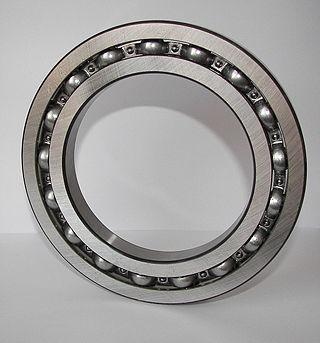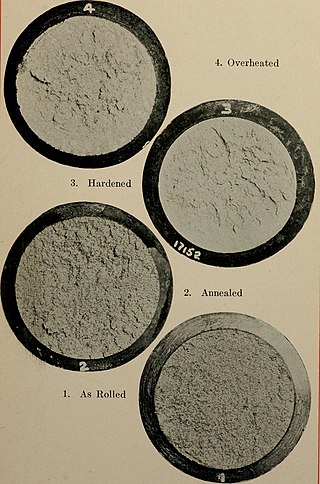
Stainless steel, also known as inox, corrosion-resistant steel (CRES), and rustless steel, is an alloy of iron that is resistant to rusting and corrosion. It contains iron with chromium and other elements such as molybdenum, carbon, nickel and nitrogen depending on its specific use and cost. Stainless steel's resistance to corrosion results from the 10.5%, or more, chromium content which forms a passive film that can protect the material and self-heal in the presence of oxygen.

The American Iron and Steel Institute (AISI) is a trade association of North American steel producers. Including its predecessor organizations, it is one of the oldest trade associations in the United States, dating back to 1855. It assumed its present form in 1908, with Judge Elbert H. Gary, chairman of the United States Steel Corporation, as its first president. Its development was in response to the need for a cooperative agency in the iron and steel industry for collecting and disseminating statistics and information, carrying on investigations, providing a forum for the discussion of problems and generally advancing the interests of the industry.

A bearing is a machine element that constrains relative motion to only the desired motion and reduces friction between moving parts. The design of the bearing may, for example, provide for free linear movement of the moving part or for free rotation around a fixed axis; or, it may prevent a motion by controlling the vectors of normal forces that bear on the moving parts. Most bearings facilitate the desired motion by minimizing friction. Bearings are classified broadly according to the type of operation, the motions allowed, or the directions of the loads (forces) applied to the parts.

Tool steel is any of various carbon steels and alloy steels that are particularly well-suited to be made into tools and tooling, including cutting tools, dies, hand tools, knives, and others. Their suitability comes from their distinctive hardness, resistance to abrasion and deformation, and their ability to hold a cutting edge at elevated temperatures. As a result, tool steels are suited for use in the shaping of other materials, as for example in cutting, machining, stamping, or forging.

Reynolds 531 is a brand name, registered to Reynolds Technology of Birmingham in the United Kingdom, for a manganese–molybdenum, medium-carbon steel tubing that was used in many quality applications, including race car chassis, aircraft components and, most famously, bicycle frame tubing. It is one of a number of tubing types developed by Reynolds.

High-speed steel is a subset of tool steels, commonly used as cutting tool material.

A pillow block bearing is a pedestal used to support a rotating shaft with the help of compatible bearings and various accessories. The assembly consists of a mounting block which houses a bearing. The block is mounted to a foundation, and a shaft is inserted, allowing the inner part of the bearing/shaft to rotate. The inside of the bearing is typically 0.025 millimetres (0.001 in) larger diameter than the shaft to ensure a tight fit. Set screws, locking collars, or set collars are commonly used to secure the shaft. Housing material for a pillow block is typically made of cast iron or cast steel.

Ferrochrome or ferrochromium (FeCr) is a type of ferroalloy, that is, an alloy of chromium and iron, generally containing 50 to 70% chromium by weight.
Spyderco is an American cutlery company based in Golden, Colorado, producing knives and knife sharpeners. Spyderco pioneered many features that are now common in folding knives, including the pocket clip, serrations, and the opening hole. Spyderco has collaborated with 30 custom knife makers, athletes, and self-defense instructors for designs and innovated the usage of 20 different blade materials.

The SAE steel grades system is a standard alloy numbering system for steel grades maintained by SAE International.
41xx steel is a family of SAE steel grades, as specified by the Society of Automotive Engineers (SAE). Alloying elements include chromium and molybdenum, and as a result these materials are often informally referred to as chromoly steel. They have an excellent strength to weight ratio and are considerably stronger and harder than standard 1020 steel, but are not easily welded, requiring thermal treatment both before and after welding to avoid cold cracking.
Carpenter Technology Corporation develops, manufactures, and distributes stainless steels and corrosion-resistant alloys. In fiscal year 2018, the company's revenues were derived from the aerospace and defense industry (55%), the industrial and consumer industry (17%), the medical industry (8%), the transportation industry (7%), the energy industry (7%), and the distribution industry (6%). The company's products are used in landing gear, shaft collars, safety wires, electricity generation products, intervertebral disc arthroplasty, and engine valves and weldings.

Aerospace bearings are the bearings installed in aircraft and aerospace systems including commercial, private, military, or space applications.

A spherical roller bearing is a rolling-element bearing that permits rotation with low friction, and permits angular misalignment. Typically these bearings support a rotating shaft in the bore of the inner ring that may be misaligned in respect to the outer ring. The misalignment is possible due to the spherical internal shape of the outer ring and spherical rollers. Despite what their name may imply, spherical roller bearings are not truly spherical in shape. The rolling elements of spherical roller bearings are mainly cylindrical in shape, but have a profile that makes them appear like cylinders that have been slightly over-inflated.
440C is a martensitic 400 series stainless steel, and has the highest carbon content of the 400 stainless steel series. It can be heat treated to reach hardness of 58 to 60 HRC. It can be used to make rolling contact stainless bearings, e.g. ball bearings and roller bearings. It is also used to make knife blades.

SAE 304 stainless steel is the most common stainless steel. It is an alloy of iron, carbon, chromium and nickel. It is an austenitic stainless steel, and is therefore not magnetic. It is less electrically and thermally conductive than carbon steel. It has a higher corrosion resistance than regular steel and is widely used because of the ease in which it is formed into various shapes.

A spherical roller thrust bearing is a rolling-element bearing of thrust type that permits rotation with low friction, and permits angular misalignment. The bearing is designed to take radial loads, and heavy axial loads in one direction. Typically these bearings support a rotating shaft in the bore of the shaft washer that may be misaligned in respect to the housing washer. The misalignment is possible due to the spherical internal shape of the house washer.

Dneprospetsstal, known as DSS, is a Ukrainian manufacturer of special stainless steel. The company is based in Zaporizhia in southeastern Ukraine, and was founded as a state-run enterprise in 1932. Its full name is JPrSC Electrometallurgical Works Dneprospetsstal named after A. N. Kuzmin. It is a publicly traded company.
X46Cr13 is the European Norm name for a common martensitic stainless steel with the numeric name 1.4034. It is equivalent to American Iron and Steel Institute standard 420C. It has the highest carbon content of the SAE 420 series.













